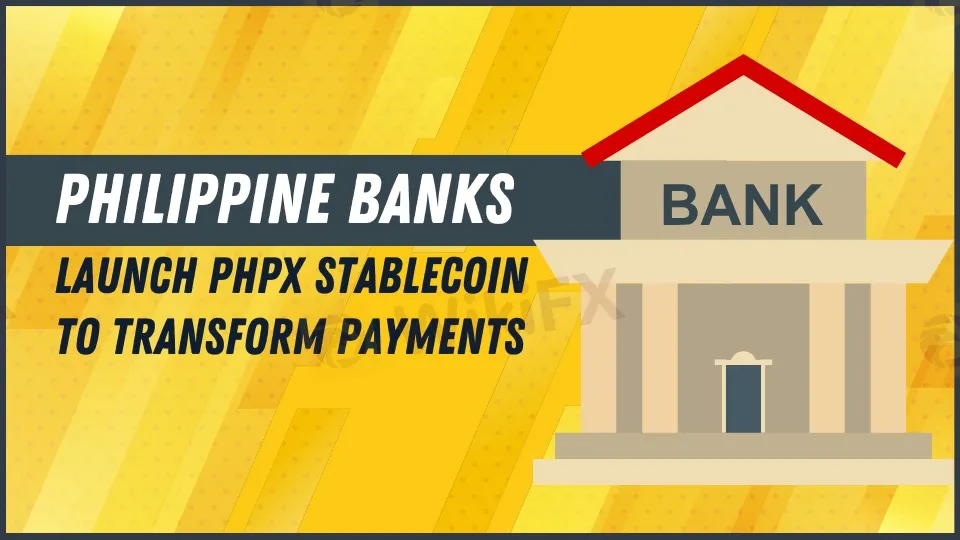简体中文
繁體中文
English
Pусский
日本語
ภาษาไทย
Tiếng Việt
Bahasa Indonesia
Español
हिन्दी
Filippiiniläinen
Français
Deutsch
Português
Türkçe
한국어
العربية
Philippine Banks Launch PHPX Stablecoin to Transform Payments
Abstract:Philippine banks introduce PHPX stablecoin, backed by bank collateral, to streamline $9T stablecoin transactions, remittances, and cross-border payments.

Philippine Banks Partner to Launch PHPX Stablecoin
PHPX, the first Philippine Peso (PHP) stablecoin, was presented by a consortium of prominent Philippine financial institutions, including UnionBank of the Philippines (UBX), Rizal Commercial Banking Corporation (RCBC), Cantilan Bank, and Rural Bank of Guinobatan. This novel digital currency is backed by bank collateral and aspires to enter the thriving $9 trillion global stablecoin transaction market in the first half of 2024.
Streamlining Investments and Payments
PHPX was created in association with Web3 fintech business JUST Finance, which is owned by FSCO and Ayannah. PHPX's major purpose is to make cross-border payments and remittances easier for Filipinos globally, with faster processing times and lower transaction fees.
PHPX is only available through licensed banks and maintains regulatory compliance through bank-backed security and real-time auditing, making it a dependable and stable financial instrument.

The stablecoin also makes money conversion easier thanks to a multi-currency exchange platform. Filipinos will be able to use major stablecoins such as USDC and EURC, boosting efficient cross-border payments.
Increased Investment Opportunities
In addition to payments, PHPX offers tokenized investments like bonds and exchange-traded funds (ETFs) in PHP, USD, and EUR. These high-yield opportunities aim to increase financial inclusion and provide Filipinos with new investment options.
Why Are Stablecoins Getting Popular Now?
Stablecoins such as PHPX are gaining popularity because of their ability to combine the advantages of cryptocurrencies (speed and efficiency) with the stability of traditional fiat currencies. They are especially handy for cross-border payments because they charge cheaper fees and are processed faster than traditional banking methods. Furthermore, their applications in tokenized investments make them appealing to individuals looking for high-yield, easily accessible financial instruments.
Final Thoughts
The introduction of PHPX signals a watershed moment in the Philippine banking sector, demonstrating its readiness to embrace Web3 technologies. The PHPX stablecoin is expected to alter how Filipinos conduct transactions and investments by offering secure, efficient, and inclusive financial solutions. This achievement places the Philippines as a major player in the global stablecoin industry.
Stablecoins are emerging as critical instruments for upgrading financial institutions around the world, as the global demand for safe, scalable digital payment solutions develops.

Disclaimer:
The views in this article only represent the author's personal views, and do not constitute investment advice on this platform. This platform does not guarantee the accuracy, completeness and timeliness of the information in the article, and will not be liable for any loss caused by the use of or reliance on the information in the article.
Read more

The Hidden Checklist: Five Unconventional Steps to Vet Your Broker
Forex broker scams continue to evolve, employing new tactics to appear credible and mislead unsuspecting traders. Identifying these fraudulent schemes requires vigilance and strategies beyond the usual advice. Here are five effective methods to help traders assess the legitimacy of a forex broker and avoid potential pitfalls.

Doo Financial Obtains Licenses in BVI and Cayman Islands
Doo Financial, a subsidiary of Singapore-based Doo Group, has expanded its regulatory footprint by securing new offshore licenses from the British Virgin Islands Financial Services Commission (BVI FSC) and the Cayman Islands Monetary Authority (CIMA).

CFI’s New Initiative Aims to Promote Transparency in Trading
A new programme has been launched by CFI to address the growing need for transparency and awareness in online trading. Named “Trading Transparency+: Empowering Awareness and Clarity in Trading,” the initiative seeks to combat misinformation and equip individuals with resources to evaluate whether trading aligns with their financial goals and circumstances.

Malaysian-Thai Fraud Syndicate Dismantled, Millions in Losses Reported
The Royal Malaysia Police (PDRM) has received 26 reports concerning the Nicshare and CommonApps investment schemes, both linked to a major fraudulent syndicate led by a Malaysian citizen. The syndicate’s activities came to light following the arrest of its leader by Thai authorities on 16 December.
WikiFX Broker
Latest News
AIMS Broker Review
The Hidden Checklist: Five Unconventional Steps to Vet Your Broker
Russia to Fully Ban Crypto Mining in 10 Regions Starting January 1, 2025
YAMARKETS' Jingle Bells Christmas Offer!
Why is there so much exposure against PrimeX Capital?
MTrading’s 2025 "Welcome Bonus" is Here
Doo Financial Obtains Licenses in BVI and Cayman Islands
CFI’s New Initiative Aims to Promote Transparency in Trading
Currency Calculator



